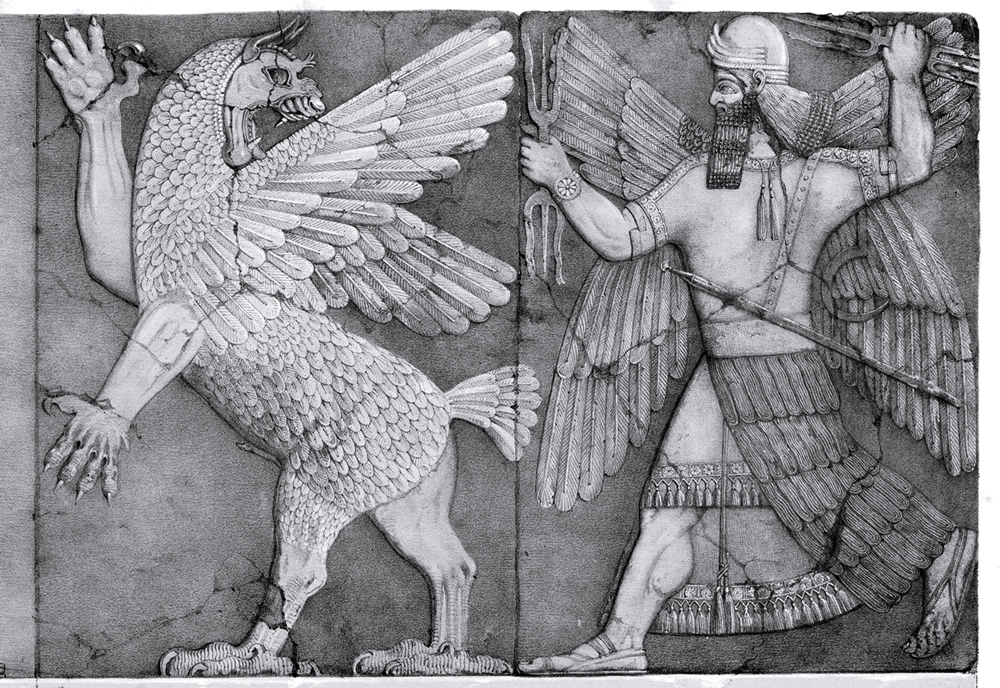
The story was told in ancient times of a God who acted quite out of character when compared with most of the other gods of ancient mythology—and then seemed to act like all the other gods, after all.
While most gods were described as amusing themselves, sometimes fighting among themselves, only occasionally taking notice of what was happening in the world of men, or sometimes deigning to pay attention when sufficient sacrifices were offered—this God took an interest in one particular tribe. The God noticed that these people had been enslaved by a powerful kingdom. Perhaps as a passing amusement or because He was more compassionate than many of his fellow gods, He decided to intervene in the world of men. He spoke to a certain man who He made into a leader and, working with this man, He caused the people of this tribe to be set free.
The people of this tribe escaped from the land of their enslavement and began travelling towards a new land with the promise of becoming a new nation. But not long after they had escaped from slavery, the people chose to worship another god. They held a religious festival to celebrate it and the first God was angry—as any of the other gods of the ancient world would have been at being cast aside in this way. But perhaps He was even more angry because He had not acted like the other gods. He had taken notice and tried to help this tribe where other gods would have ignored them.
The God summoned the tribal leader and told him that He was so angry that He was going to destroy all the people, but that the leader and his family would be spared. The God said that these few survivors would be the beginning of a new chosen tribe and they would be favoured by the God for as long as they and their descendants lived.
A different ending
Anyone with a passing knowledge of ancient mythologies—with their various and usually fractious gods—would be likely to accept this as the expected end of the story. In these mythic stories, once the anger of the gods was aroused, their retribution would be both swift and harsh—proportionate to the level of slight inflicted against the deity. For all their power and posing, most ancient gods were thin-skinned, quick-tempered and vengeful.
However, if you have a passing knowledge of the ancient Bible stories, you might recognise a simplified version of the story of the people of Israel, their escape from slavery in the land of Egypt and their faithlessness toward the God who they had so recently promised to follow. In place of their rescuing God, the people made a golden idol in the form of a calf and proceeded to worship and celebrate it.

Then God said to Moses, the Israelite leader, “I have seen how stubborn and rebellious these people are. Now leave me alone so my fierce anger can blaze against them, and I will destroy them. Then I will make you, Moses, into a great nation” (Exodus 32:9-10).
Following the pattern of the ancient myth stories, this would have been the end of the story and an origin story of Moses’ new nation. But this story has a surprising ending. Rather than accept the honour that God was offering to him and his family, Moses urged God to reconsider. He retold the story of how God had chosen the people of Israel and had done incredible things to rescue them from slavery in Egypt, fulfilling the promises He had made centuries earlier to their ancestors, Abraham, Isaac and Jacob.
The outcome of Moses’ plea on behalf of the people: “So the Lord changed his mind about the terrible disaster he had threatened to bring on his people” (Exodus 32:14).
But this was not yet the end of the story. The next day, God seemed to be angry all over again. And Moses had to make his arguments again, confessing the people’s great sin against God. He also made a remarkable counter-offer to God’s invitation that Moses and his family would be the ones who He would begin again with: “But now, if you will only forgive their sin—but if not, erase my name from the record you have written!” (Exodus 32:32).
Re-reading this story
There are different ways this story can inform us about the relationship between the God of the Bible and humanity—particularly Moses and the people of Israel in this case.
The first is that this was a test of Moses and his commitment to leading the people. Even though they had only been free of Egypt for a couple of months, the people had already begun to complain to and about Moses and his leadership, as well as the difficult conditions they were travelling through. The temptation for Moses was that he could be free of that responsibility and his own family would become the sole focus of God’s care and blessings.
The second possibility for reading this story is that this was an example of a human being arguing with God, making a strong argument about how God should be acting in such circumstances, and that God listened and chose to act differently. Moses urged God that acting in the way God had angrily suggested would make God look bad, particularly to the surrounding nations who would hear about His planned outburst against the people. In any event, Moses appealed to God to act better than the usual mythologies of jealous and vengeful gods—and to act according to His divine nature.

Self-sacrificing survivors
Either way we read this ancient story—or even reading it with both these meanings—can help us in thinking about an idea that comes up later in the Bible’s story. Amid the upheaval and conflict, the symbols and beasts, the hope and judgement of the book of Revelation, there is a description of a group of people,
perhaps a group of survivors, who stand true amid the judgements of God and the threats of the evil powers (see Revelation 12:17 and Revelation 14:12). These verses identify this “remnant” group of people as those who seek to live by the commands of God and remain faithful to Jesus, despite the circumstances and trials they endure.
But perhaps the ancient but very different story of Moses and his desperate argument with God on behalf of the larger group of people can also help us understand the role of these survivors. They seek to live humbly and not think of themselves as more important, especially if any special status would come at a cost or loss to others. They are prepared to sacrifice to serve and protect others. And, in a world in which God’s character is often called into question, they seek to represent God as good and loving, seeking ways in which God’s hope and blessing can be offered and applied to the lives of people outside of their own tribal group.
As the Bible portrayed it, being a “remnant” is a daunting calling. It is about being the ultimate survivors amid a world that promotes self-interest and self-preservation, and that expects the worst from any and all of its gods. In contrast, it is to insist on the goodness of God, and to seek to live and share the light and love that is found in His goodness.
Nathan Brown is a keen reader and book editor at Signs Publishing Company.






